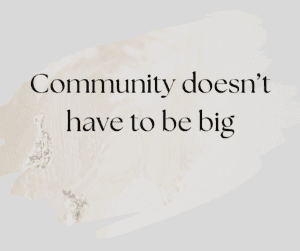Why Feeling Like You Belong Can Help with Depression and Anxiety
Sometimes life can feel a bit much.
Work stress, family responsibilities, constant notifications, chores, finances and everything else that comes with life - it’s easy to feel overwhelmed.
Feeling overwhelmed can turn into persistent anxiety or depression, which can feel lonely and isolating.
That sense of isolation then exacerbates and maintains feelings of depression and anxiety as we are wired for connection. We generally thrive in community - even those of us who desire less human contact still need community.
Of course connection doesn’t magically fix mental health struggles but it can make a big difference, especially to depression and anxiety.
The Power of Belonging
Think about a time when you really felt like you belonged—maybe with a group of friends who just “got” you, or a team at work where your
contributions were genuinely valued. It probably felt grounding. Like a little weight was lifted.
That sense of belonging acts like a protective buffer against mental health difficulties. When we feel connected to others, we're more likely to talk about what we're going through, get emotional support, and feel less alone in our struggles. It doesn’t take away anxiety or depression, but it helps us carry it.
Isolation Makes It Worse
Depression and anxiety are tricky in that the experience makes us withdraw, stay at home, cancel plans, ignore messages. And while rest and quiet is absolutely necessary, too much isolation can feed the very thing we’re trying to escape.
Without people around us to offer perspective, encouragement, or even just distraction, our thoughts can spiral. We might believe we’re a burden if we’re struggling, or that no one really cares.
Having a community that we feel we belong to can help us be alone without feeling isolated, and interrupt negative thoughts when we are with others.

Community Doesn’t Have to Be Big
We don’t need a huge social circle. We don’t have to be the life of the party unless we want to. Even having one or two people to feel safe with, who listen without judgement and check in now and then, can help build resilience. Being part of this reciprocal support and community can also strengthen our self-esteem and sense of meaning.
It could be a close friend, a support group, a book club, a faith community, or a trusted coworker. Belonging isn’t about how many people we know, it’s about how seen and supported we feel by the people we do know.
Making the First Move
If you’re struggling right now, the idea of reaching out might feel overwhelming.
That’s okay.
Start small.
Send a text.
Accept an invite.
Join an online group that shares your interests.
Even short conversations, like chatting with a neighbour, can spark a tiny sense of connection.
And if you’re doing okay at the moment, look around - is there someone you haven’t heard from in a while? Reaching out might mean more than you know.
Belonging Is a Mental Health Tool
We often talk about therapy, medication, and self-care—and rightly so. But community is part of the picture too. It’s a quiet kind of medicine. It doesn’t ask you to be perfect. It just asks you to show up, as you are.
So whether you're struggling or supporting someone else, please remember we’re not meant to do life alone. And sometimes, just knowing we belong is enough to lighten the load.


